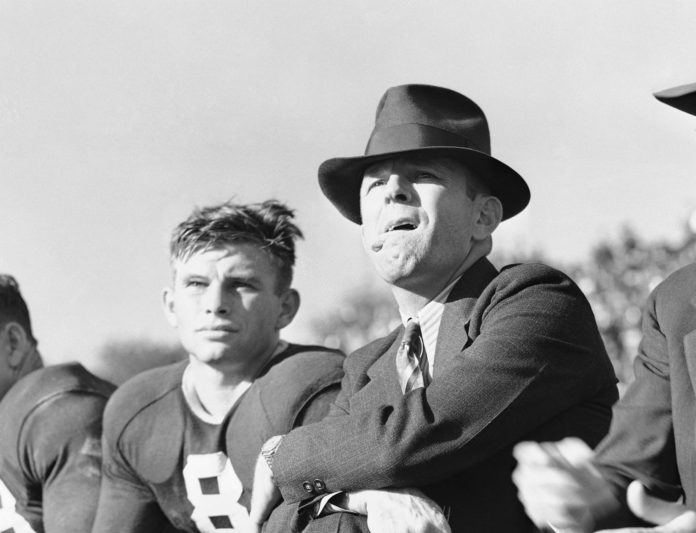Davey O’Brien Foundation
http://daveyobrienaward.org/2017/06/davey-obrien-at-100/
Davey O’Brien, the legendary TCU late 1930s quarterback who greatly helped the Horned Frogs win a national championship, lost his battle with cancer in 1977 at the age of 60. Had he not suffered fatal health issues and was still alive, he would have turned 100 on Thursday, June 22.
O’Brien was born in Dallas on June 22, 1917. As a youth, he quarterbacked a sandlot football team self-named the Gaston Avenue Bulldogs He was a 118-pound, 5-foot-7 all-state selection who led Woodrow Wilson High School to the Texas State playoffs in 1932.
O’Brien enrolled at Texas Christian University in 1935 and played behind the legendary quarterback Sammy Baugh. In 1937, O’Brien’s first season as starting quarterback, TCU posted a 4-4-2 record. However, O’Brien was a standout player who was named to the first-team All-Southwest Conference.
In 1938, the 150-pound O’Brien, often referred to as “Little Davey,” threw for 1,457 passing yards, a Southwest Conference record that stood for 10 years. He had only four interceptions in 194 passing attempts, and set a NCAA record for most rushing and passing plays in a single season. That year O’Brien led the Horned Frogs to their first undefeated season, as they outscored their opponents by a 269-60 margin and held nine of their 10 regular-season opponents to seven points or less, including three shutouts. With O’Brien at the helm of their offense, the Horned Frogs’ season culminated with a National Championship title following a 15-7 victory over Carnegie Tech in the Sugar Bowl.
O’Brien amassed remarkable accolades as a college athlete – named to 13 All-America teams and the first player to win the Heisman, Maxwell and Walter Camp trophies. He was the first Heisman winner from both TCU as well as the Southwest Conference. When he went to New York to accept the Heisman Trophy, Fort Worth boosters hired a stagecoach to carry him to the Downtown Athletic Club.
After graduating from TCU, O’Brien was selected fourth overall in the 1939 NFL Draft and signed a $10,000 contract with the Philadelphia Eagles of the National Football League. In his rookie season with the Eagles, he passed for 1,324 yards in 11 games, breaking Baugh’s NFL record and was named first-team quarterback on the NFL’s All-Star Team. The Eagles gave him a $2,000 raise, but the NFL’s highest-paid player retired after the 1940 season to join the Federal Bureau of Investigation.
After completing his training, he was assigned to the bureau’s field office in Springfield, Missouri. O’Brien was a firearms instructor at Quantico, Virginia., and spent the last five years of his FBI career in Dallas. He retired from the bureau in 1950 and went to work for Haroldson L. Hunt in land development. He later entered the oil business working for Dresser-Atlas Industries of Dallas.
O’Brien was named to the College Football Hall of Fame in 1955 and the Texas Sports Hall of Fame in 1956. In 1971, he was diagnosed with cancer and underwent surgery to remove a kidney and part of his right lung. He lost his courageous battle with cancer on Nov. 18, 1977.
The Davey O’Brien Foundation, founded to honor and remember the strong character and leadership of O’Brien, celebrated its 40th anniversary in 2016. In addition to the Davey O’Brien National Quarterback Award, which is the oldest and most prestigious college quarterback award, the Foundation recognizes champions on and off the field through awards programs encouraging academic and career success. The Foundation has granted more than $1 million in scholarships and university grants to help high school and college athletes transform leadership on the field into leadership in life.






